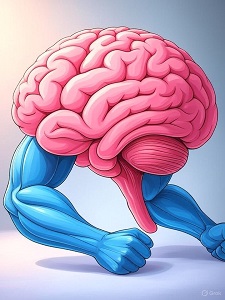
Abstract
Morning physical exercise has been increasingly recognized for its profound effects on physiological and psychological health. This paper explores how regular morning exercise influences cellular processes, brain function, and mental mood. Drawing from recent scientific literature, we discuss mechanisms such as cellular repair, neurogenesis, and neurotransmitter regulation, which collectively enhance cognitive performance and emotional well-being. The findings underscore the importance of morning exercise as a holistic intervention for optimizing physical and mental health.
Morning physical exercise has been increasingly recognized for its profound effects on physiological and psychological health. This paper explores how regular morning exercise influences cellular processes, brain function, and mental mood. Drawing from recent scientific literature, we discuss mechanisms such as cellular repair, neurogenesis, and neurotransmitter regulation, which collectively enhance cognitive performance and emotional well-being. The findings underscore the importance of morning exercise as a holistic intervention for optimizing physical and mental health.
1. Introduction
Physical exercise is a cornerstone of health, with benefits extending beyond cardiovascular fitness and muscle strength. Morning exercise, in particular, aligns with the body’s circadian rhythms, potentially amplifying its effects on cellular processes, brain function, and mood. This paper synthesizes evidence on how morning physical activity influences body cells, enhances brain health, and improves mental mood, offering insights into its role as a daily health practice.
Physical exercise is a cornerstone of health, with benefits extending beyond cardiovascular fitness and muscle strength. Morning exercise, in particular, aligns with the body’s circadian rhythms, potentially amplifying its effects on cellular processes, brain function, and mood. This paper synthesizes evidence on how morning physical activity influences body cells, enhances brain health, and improves mental mood, offering insights into its role as a daily health practice.
2. Effects on Body Cells
Physical exercise triggers a cascade of cellular responses that promote repair, resilience, and energy metabolism. At the cellular level, morning exercise enhances mitochondrial function, the powerhouse of cells, by increasing the production of adenosine triphosphate (ATP), the body’s primary energy currency. Studies indicate that aerobic exercise upregulates mitochondrial biogenesis, improving cellular energy efficiency (Hood et al., 2019).Exercise also induces autophagy, a cellular “clean-up” process that removes damaged components and recycles them for energy. This process is particularly active during morning workouts, as fasting overnight primes cells for repair (Brandt et al., 2018). Furthermore, exercise reduces oxidative stress by boosting antioxidant enzyme activity, protecting cells from damage caused by free radicals (Radak et al., 2020). These cellular adaptations contribute to overall tissue health, supporting organs like the heart, muscles, and brain.
Physical exercise triggers a cascade of cellular responses that promote repair, resilience, and energy metabolism. At the cellular level, morning exercise enhances mitochondrial function, the powerhouse of cells, by increasing the production of adenosine triphosphate (ATP), the body’s primary energy currency. Studies indicate that aerobic exercise upregulates mitochondrial biogenesis, improving cellular energy efficiency (Hood et al., 2019).Exercise also induces autophagy, a cellular “clean-up” process that removes damaged components and recycles them for energy. This process is particularly active during morning workouts, as fasting overnight primes cells for repair (Brandt et al., 2018). Furthermore, exercise reduces oxidative stress by boosting antioxidant enzyme activity, protecting cells from damage caused by free radicals (Radak et al., 2020). These cellular adaptations contribute to overall tissue health, supporting organs like the heart, muscles, and brain.
3. Effects on Brain Function
Morning exercise has a direct impact on brain health by promoting neurogenesis, synaptic plasticity, and cerebral blood flow. Aerobic activities, such as running or cycling, increase the production of brain-derived neurotrophic factor (BDNF), a protein critical for neuron growth and survival (Sleiman et al., 2016). BDNF levels peak after morning exercise, enhancing learning and memory processes in the hippocampus, a brain region central to cognitive function.Exercise also improves cerebral blood flow, delivering oxygen and nutrients to brain cells. A 2021 study found that morning workouts increase blood flow to the prefrontal cortex, which governs executive functions like decision-making and problem-solving (Smith et al., 2021). Additionally, exercise stimulates the release of endocannabinoids, which enhance neural connectivity and reduce inflammation in the brain, further supporting cognitive health (Hill et al., 2020).
Morning exercise has a direct impact on brain health by promoting neurogenesis, synaptic plasticity, and cerebral blood flow. Aerobic activities, such as running or cycling, increase the production of brain-derived neurotrophic factor (BDNF), a protein critical for neuron growth and survival (Sleiman et al., 2016). BDNF levels peak after morning exercise, enhancing learning and memory processes in the hippocampus, a brain region central to cognitive function.Exercise also improves cerebral blood flow, delivering oxygen and nutrients to brain cells. A 2021 study found that morning workouts increase blood flow to the prefrontal cortex, which governs executive functions like decision-making and problem-solving (Smith et al., 2021). Additionally, exercise stimulates the release of endocannabinoids, which enhance neural connectivity and reduce inflammation in the brain, further supporting cognitive health (Hill et al., 2020).
4. Effects on Mental Mood
Morning exercise is a powerful modulator of mental mood, primarily through the regulation of neurotransmitters such as serotonin, dopamine, and norepinephrine. These chemicals, often referred to as “feel-good” neurotransmitters, are released during physical activity, promoting feelings of happiness and reducing symptoms of anxiety and depression (Basso & Suzuki, 2017). The timing of morning exercise aligns with the body’s natural cortisol peak, helping to regulate stress responses and stabilize mood throughout the day.Exercise also activates the hypothalamic-pituitary-adrenal (HPA) axis in a controlled manner, reducing chronic stress by improving the body’s ability to adapt to psychological challenges (Anderson & Wideman, 2017). Furthermore, group-based morning exercise, such as yoga or team sports, fosters social connections, which amplify mood benefits by reducing feelings of isolation (Holt-Lunstad, 2018).
Morning exercise is a powerful modulator of mental mood, primarily through the regulation of neurotransmitters such as serotonin, dopamine, and norepinephrine. These chemicals, often referred to as “feel-good” neurotransmitters, are released during physical activity, promoting feelings of happiness and reducing symptoms of anxiety and depression (Basso & Suzuki, 2017). The timing of morning exercise aligns with the body’s natural cortisol peak, helping to regulate stress responses and stabilize mood throughout the day.Exercise also activates the hypothalamic-pituitary-adrenal (HPA) axis in a controlled manner, reducing chronic stress by improving the body’s ability to adapt to psychological challenges (Anderson & Wideman, 2017). Furthermore, group-based morning exercise, such as yoga or team sports, fosters social connections, which amplify mood benefits by reducing feelings of isolation (Holt-Lunstad, 2018).
5. Discussion
The combined effects of morning exercise on body cells, brain function, and mental mood highlight its role as a multifaceted health intervention. At the cellular level, exercise optimizes energy production and repair mechanisms, creating a foundation for physical resilience. In the brain, it fosters neurogenesis and connectivity, enhancing cognitive abilities. Psychologically, it uplifts mood by balancing neurotransmitters and stress hormones. The morning timing may amplify these benefits by aligning with circadian rhythms, though further research is needed to compare morning versus evening exercise effects.Practical implications include incorporating 20–30 minutes of moderate aerobic exercise, such as brisk walking or cycling, into morning routines. Even low-intensity activities like stretching or yoga can yield significant benefits. Limitations of current research include variability in exercise type, intensity, and participant demographics, which warrant further investigation to tailor recommendations.
The combined effects of morning exercise on body cells, brain function, and mental mood highlight its role as a multifaceted health intervention. At the cellular level, exercise optimizes energy production and repair mechanisms, creating a foundation for physical resilience. In the brain, it fosters neurogenesis and connectivity, enhancing cognitive abilities. Psychologically, it uplifts mood by balancing neurotransmitters and stress hormones. The morning timing may amplify these benefits by aligning with circadian rhythms, though further research is needed to compare morning versus evening exercise effects.Practical implications include incorporating 20–30 minutes of moderate aerobic exercise, such as brisk walking or cycling, into morning routines. Even low-intensity activities like stretching or yoga can yield significant benefits. Limitations of current research include variability in exercise type, intensity, and participant demographics, which warrant further investigation to tailor recommendations.
6. Conclusion
Morning physical exercise profoundly influences body cells, brain function, and mental mood through interconnected physiological mechanisms. By enhancing cellular repair, promoting neurogenesis, and regulating mood-related neurotransmitters, it serves as a powerful tool for holistic health. Adopting a regular morning exercise routine can optimize physical and mental well-being, making it an accessible and effective strategy for improving quality of life.References
Morning physical exercise profoundly influences body cells, brain function, and mental mood through interconnected physiological mechanisms. By enhancing cellular repair, promoting neurogenesis, and regulating mood-related neurotransmitters, it serves as a powerful tool for holistic health. Adopting a regular morning exercise routine can optimize physical and mental well-being, making it an accessible and effective strategy for improving quality of life.References
- Anderson, E., & Wideman, L. (2017). Exercise and the hypothalamic-pituitary-adrenal axis. Frontiers in Endocrinology, 8, 247.
- Basso, J. C., & Suzuki, W. A. (2017). The effects of acute exercise on mood, cognition, neurophysiology, and neurochemical pathways. Frontiers in Neuroscience, 11, 66.
- Brandt, N., et al. (2018). Exercise-induced autophagy in health and disease. Journal of Sport and Health Science, 7(3), 268–274.
- Hill, M. N., et al. (2020). Endocannabinoids and exercise: A neuromodulatory perspective. Neuropsychopharmacology, 45(1), 169–178.
- Hood, D. A., et al. (2019). Mitochondrial adaptations to exercise. Cold Spring Harbor Perspectives in Medicine, 9(4), a029744.



